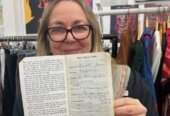The Returned and Services Association (RSA) is increasing awareness of New Zealand’s younger veterans to celebrate the 100th anniversary of their annual Poppy Appeal.

In 1922, the RSA established the Poppy Appeal to fund the support of veterans returning from the First World War, as well as their families. But as Graeme Ambler, Te Awamutu’s RSA secretary manager said, “the RSA is old, but not all of its members are.”
The association claims that over the past 30 years, New Zealand has created over 30,000 veterans under the age of 50. Ambler said there are around 60 in the Te Awamutu area who fit into this demographic.
“While soldiers today face different issues, our support of them still continues,” he said.
The RSA wishes to spread an awareness of these veterans, so that they can be properly recognised and supported. Peter Watson, the president of Te Awamutu’s RSA, says there is a stigma amongst returning servicemen, where veteran means an “old guy”.
He believes that this stigma is preventing servicemen from seeking support at the RSA. “Their problems are no different to those ‘old guys’,” Watson said. “Probably more complex in some ways, because of the technologies they’re dealing with.”
Terry Findlay, a Vietnam veteran and lifetime RSA member said the problems that some veterans face extend much further than just physical injuries, and thus require more complicated support.
“I’m lucky with my family, that they understood, but I went through a bad patch… you withdraw into yourself… you don’t want to talk to anybody,” he said.
Findlay said he struggled until he saw an ex-army doctor who understood his experiences. “It changed my life, just finding somebody who understands what you’ve been through.”

RSA members, from left, Terry Findlay, Peter Watson, and Graeme Ambler.
Ambler said that although each veteran has their own unique experiences, the RSA exists to support one another, including the younger servicemen who do not, although should, consider themselves to be veterans.
“It’s a place for them to come to actually get back into the community itself,” he said.
“How we connect with them, that is where we’ve got a little bit of a problem,” said Watson. “This should be their home.”
Poppy pins can be gained throughout April by way of a gold coin donation.
The Appeal runs for the entirety of the month, with Poppy Day, April 22, being the organisation’s most significant collection day.
Related: Painting will be a fundraiser








